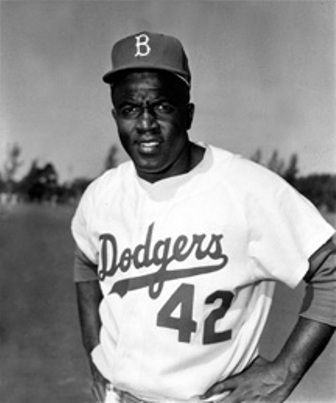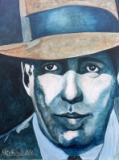Boxers
Boxing great Henry Armstrong hammered away at discrimination in the 1930s and 1940s by refusing to fight in segregated arenas.

Jackie Robinson was the first African-American major-leaguer. With his help, the Brooklyn Dodgers won 6 pennants in his ten seasons. Honored internationally as the central figure in baseball's "Noble Experiment," Jack Roosevelt Robinson, known in the world of baseball as Jackie Robinson, took the first steps toward integrating the sport's major league teams when he signed a contract to play with the Brooklyn Dodgers in 1947.
Jack Roosevelt Robinson was born in Cairo, Georgia in 1919 to a family of sharecroppers. His mother, Mallie Robinson, single-handedly raised Jackie and her four other children. They were the only black family on their block, and the prejudice they encountered only strengthened their bond.
In 1935, Robinson graduated from Washington Junior High School and enrolled at John Muir High School. Recognizing his athletic talents, Robinson's older brother Mack, who was himself an accomplished athlete and silver medalist at the 1936 Summer Olympics, inspired Jackie to pursue his interest in sports. At Muir Tech, Robinson played several sports at the varsity level and lettered in four of them: football, basketball, track, and baseball. He played shortstop and catcher on the baseball team, quarterback on the football team, and guard on the basketball team. With the track and field squad, he won awards in the broad jump. He was also a member of the tennis team, winning in the junior boys singles championship in the annual Pacific Coast Negro Tennis Tournament in 1936. That same year Jackie Robinson earned a place on the Pomona annual baseball tournament all-star team, which included future Hall of Famers Ted Williams and Bob Lemon. In late January 1937, the Pasadena Star-News newspaper reported that Robinson "for two years has been the outstanding athlete at Muir, starring in football, basketball, track, baseball and tennis."
At UCLA, Jackie Robinson became the first athlete to win varsity letters in four sports: baseball, basketball, football and track. In 1941, he was named to the All-American football team. Due to financial difficulties, he was forced to leave college, and eventually decided to enlist in the U.S. Army. After two years in the army, he had progressed to second lieutenant. Jackie's army career was cut short when he was court-martialed in relation to his objections with incidents of racial discrimination. In the end, Jackie left the Army with an honorable discharge.
After the Army, Jackie Robinson accepted an offer from his old friend and pastor Rev. Karl Downs to be the athletic director at Sam Huston College in Austin. The job included coaching the school's basketball team for the 1944–45 season. As a fledgling program, few students tried out for the basketball team, and Robinson even resorted to inserting himself into the lineup for exhibition games. Although his teams were outmatched by opponents, Robinson was respected as a disciplinarian coach, and drew the admiration of, among others, Langston University basketball player Marques Haynes, a future member of the Harlem Globetrotters.
Robinson began playing professional baseball in the Negro Leagues, but he was soon chosen by Branch Rickey, a vice president with the Brooklyn Dodgers, to help integrate major league baseball. Rickey interrogated Robinson extensively for three hours on August 28, 1945. In a dramatization of hotel, restaurant, and game situations, he glared at Robinson, shouting demeaning words and phrases while observing his reactions. At the end he quoted the Biblical passage that advises turning the other cheek. Satisfied that Robinson met the tests of ability, stamina, and tolerance, Rickey exacted a promise of extreme patience and forbearance for three years, then offered him a contract. On October 23, 1945, Rickey made the historic announcement that Jackie Robinson, a black man, would play for the Montreal Royals, the minor league affiliate of the Brooklyn Dodgers. Satchel Paige gave a ringing endorsement of Robinson as the best possible selection for "The Noble Experiment."
Moving to Florida in 1946 to begin spring training with the Royals, Jackie Robinson played his first game on March 17, 1945. At the end of one year with the Montreal Royals, the Brooklyn Dodgers brought Robinson up from the minors to open the 1947 season. The team won the league title and Robinson finished with a .297 batting average, a league-leading 29 stolen bases, and the title of Major League Rookie of the Year.
Robinson soon became a hero of the sport, even among former critics, and was the subject for the popular song, "Did You See Jackie Robinson Hit That Ball?" An exceptional base runner, Robinson stole home 19 times in his career, setting a league record. He also became the highest-paid athlete in Dodgers history, and his success in the major leagues opened the door for other African-American players, such as Satchel Paige , Willie Mays, and Hank Aaron.
Robinson also became a vocal champion for African-American athletes, civil rights, and other social and political causes. In July 1949, he testified on discrimination before the House Un-American Activities Committee. In 1952, he publicly called out the Yankees as a racist organization for not having broken the color barrier five years after he began playing with the Dodgers.
Jackie Robinson's induction into baseball's Hall of Fame in 1962 was a cause of celebration for black people around the world. He chose his wife, Rachel, his mother, Mallie, and his friend, Branch Rickey, to flank him in the Cooperstown award ceremony. This highest possible recognition of Robinson's skill and service was a symbol of victory to African Americans in the continuing struggle against injustice.
Robinson's Hall of Fame plaque records the highlights of his brilliant career. With the Brooklyn National League 1947 to 1956, he was the leading National League batter in 1949 and holds the fielding mark for second baseman, playing 150 or more games with .992. He led the National League in stolen bases in 1947 and 1949 and was named Most Valuable Player in 1949. He is joint record holder for most double plays by second basemen, 137 in 1951. He led second basemen in double plays from 1949 through 1952.
Don't miss a single page. Find everything you need on our complete sitemap directory.
Listen or read the top speeches from African Americans. Read more
Read about the great African Americans who fought in wars. Read more
African Americans invented many of the things we use today. Read more
Thin jazz, think art, think of great actors and find them here. Read more
Follow the history of Black Americans from slave ships to the presidency. Read more
Olympic winners, MVPS of every sport, and people who broke the color barrier. Read more
These men and women risked and sometimes lost their life to fight for the cause. Read more
Meet the people who worked to change the system from the inside. Read more

Visit my RedBubble page and use Michael Arnold Art to create greeting cards, T-shirts, mugs, and more.

The variety and impressive numbers of mammals, birds and marine wildlife in Alaska draw visitors from all over the world. For some travelers, Alaska is wilderness, at least compared to what they may know from back home. The pristine wilderness of Alaska is, perhaps, the last vestige of thriving populations of North American wildlife. Where else can you see polar bears, bald eagles, blue and humpbacked whales, gray wolves, grizzly bears, orcas, lynx, moose, and hundreds of other rare and endangered species in their original and undisturbed natural habitats?

Enjoy our website filled with original signed acrylic paintings by award winning Artist Michael Arnold. Located in Citrus County Florida, Michael Arnold is a the editor at the Citrus County Chronicle. When he's not busy being an editor, he is an avid artist who enjoys painting in a variety of styles. We hope you take the time to click on each image to see a larger view and to learn what the artist, Michael Arnold has to say about his paintings.

As dog owners and people who care deeply for animals and wildlife, we wanted our Dog Encyclopedia to be a website that could empower pet owners to create the most positive, loving environment for their dogs. Dog Encyclopedia realizes that owning a dog is like adding a new member to your family.

Floridian Nature has everything your are looking for in Florida nature. The wildlife of Florida is rich and varied, yet most of us are familiar with only a dozen or so species: the "well known endangered species such as manatees and panthers; those, like raccoons and squirrels, that have adapted to urban environments; the frightening alligators and black bears; and those like the armadillo who can't seem to cross the road. Yet they are just a few of the many animal species found in Florida.
